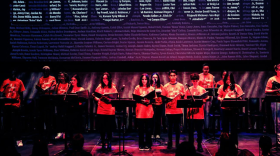
By a couple of years ago, the Hawai‘i Shakespeare Festival had finished performing all The Bard’s plays--the great, the obscure, and the questionable. At this point, real experimentation is getting unleashed. Inspired by David Peterson, who developed languages for the Game of Thrones series, one of the founders of the festival has devised invented languages for "A Midsummer Night’s Dream." HPR’s Noe Tanigawa reports.
"A Midsummer Night’s Dream" continues at The ARTS at Marks' Garage through August 21, 2016.
In celebration of the 400th anniversary of Shakespeare's death, standby tickets are FREE at the door, or you can buy advance reservations.

Shakespeare Festival co-founder, producer director, Tony Pisculli wasn’t at all defensive when I asked what he’s doing to us with this Midsummer Night’s Dream.
“What we are doing is what I’m trying to do with it. So this is an experiment to see if we can tell the story without leaning on the language at all.”
Why? One could ask. In fact I did ask Peter Webb, an English literature scholar who teaches Shakespeare at ‘Iolani School.
“I’ve got my cross and my holy water and I’m going "What!? You’re disgracing Shakespeare!!" But on the other hand, it is such a well-known play, that it’s kind of fun to shake it and see what falls out. But the flip side of the bargain is, there has to be a reason for it.”
For this production, Pisculli wrote a software program that translated Shakespeare’s words, sound by sound, into two invented languages, one for the Greeks, one for the fairies, meter intact. That was very important.
“They are first and foremost plays and even without the beautiful language there’s a lot of craft there. Shakespeare creates these incredible characters and then puts them onstage together and gives them conflicts. They express these conflicts very eloquently and beautifully, but those conflicts are interesting in and of themselves, even if you don’t know the words.”
“Shakespeare actually uses the meter in order to tell his actors and his audience what’s important,” according

to Webb. He's talking about the use of iambic pentameter. He says meaning is almost embedded in the rhythm and accents of the verse.
"Go back to "To be or not to be," the accents fall on the two, four, and six syllables because there are even numbered syllables in that line. So if you take out the unaccented syllables and just say the accented syllables, you get “Be...not be” and you can kind of do the cave man Hamlet right there! He’s using the meter to emphasize the meaning. By playing with the way in which he places words in a metrical pattern, Shakespeare can give us yet another layer of understanding. ”
An added revelation emerged with the invented languages, says Pisculli. “When you strip the words away, you strip away a lot of the preconceptions that come with those words, the baggage that’s associated with those words. Words like fairy. Fairies are not cute by any means, they are dangerous, they are amoral, they are meddling, malevolent is a great word, yes.”
The play is all female actors, by the way, but you won’t even notice. In a season of gender issue plays, this production happily takes the cake for gender neutral. There is romance, but somehow we're in a maybe future world where gender is more fluid.
“I’ve never seen such energy being thrown from actor to actor onstage," says Eden Lee Murray, who teaches and directs Shakespeare at the Hawai'i Theatre. She plays Egeus in this production. "You can’t just lay on the lines. You have to use your face, your body, your expressions, your voice, to make sure the story is told using this language. It’s breathtaking.”
Peter Webb says Shakespeare was writing for the most popular medium of his time, theater. If he were writing today he might be writing an HBO or Amazon series. Is there any chance we’ll be reading those scripts 400 years hence?




